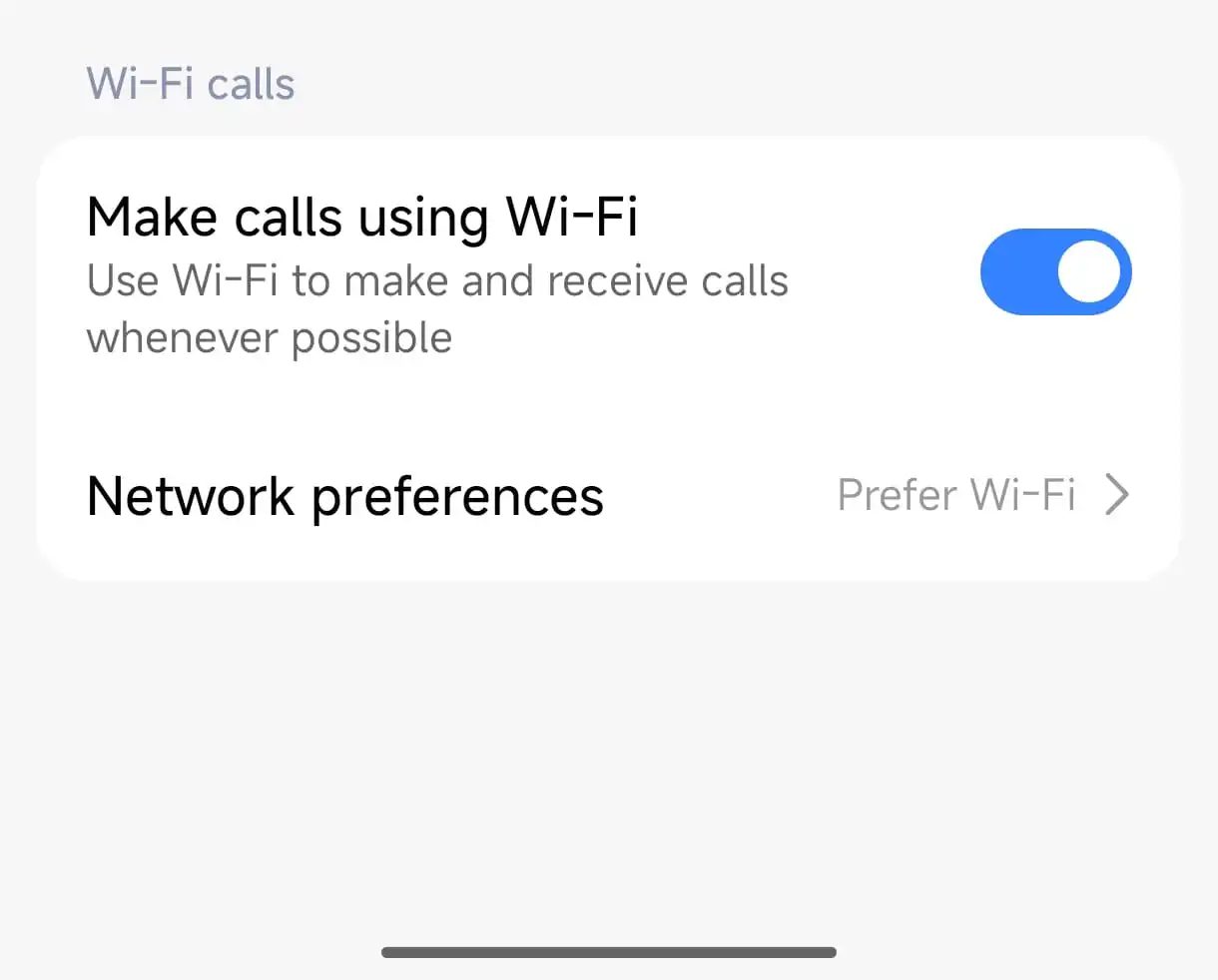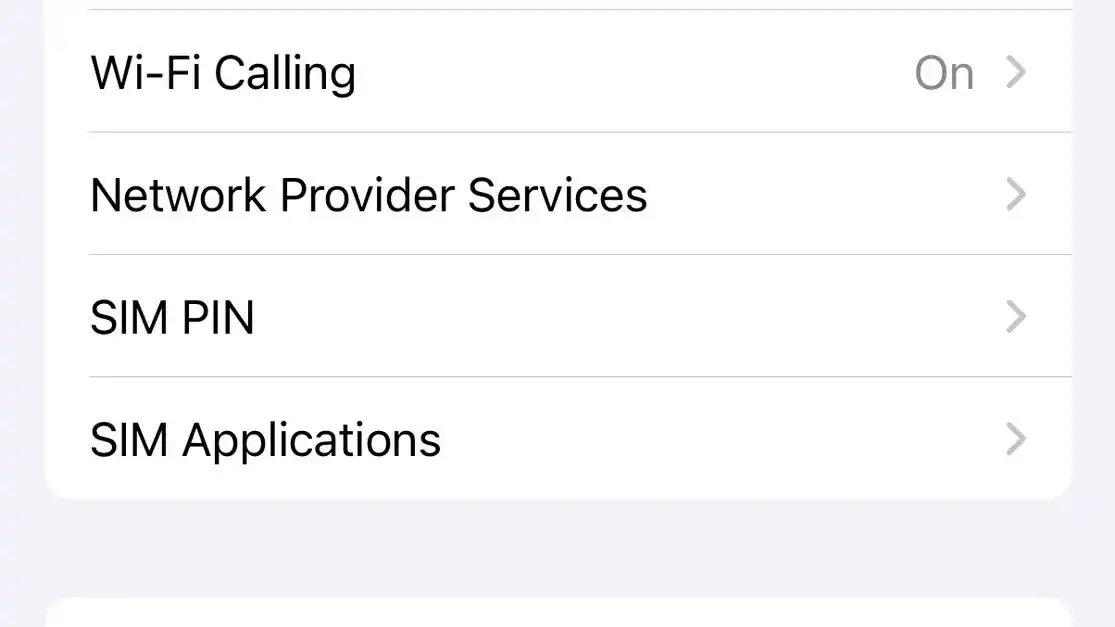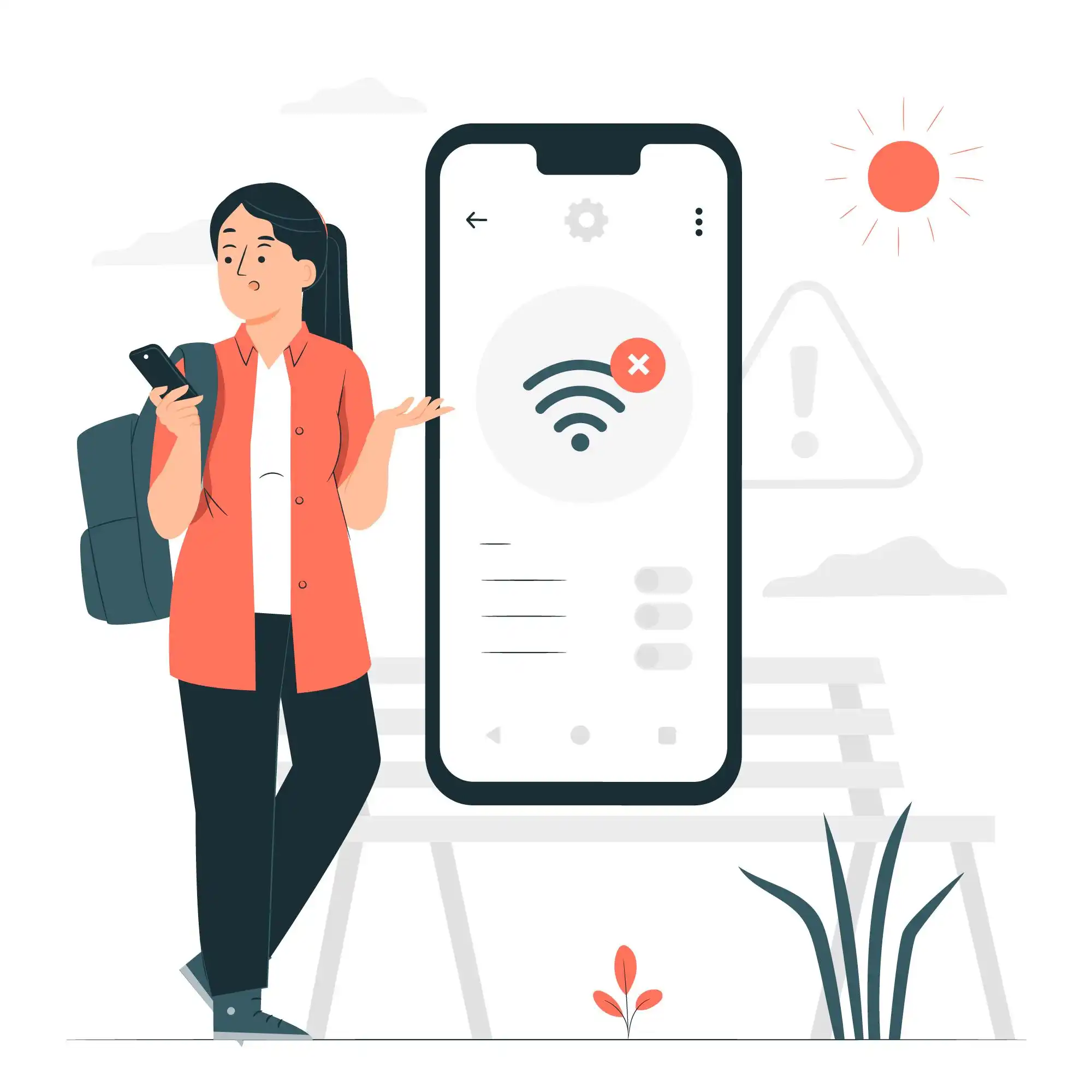In this article, we will describe the technology behind Voice over Wi-Fi (VoWiFi) and how to enable it on Android and iOS devices. Additionally, we will cover its comparison with VoLTE, its benefits, pros and cons, device compatibility, and practical FAQs. Continue reading to learn how you can enhance your Wi-Fi calling experience, as it offers greater dependability and affordability.
1. What Does VoWiFi Mean?
VoWiFi, which means Voice over Wi-Fi, allows users to make voice calls or send SMS using a connection to the internet through a Wi-Fi network, as opposed to the conventional cellular mobile network. VoWiFi is especially useful when the mobile network signal is weak or not available at all.
It means that you can make voice calls as long as you are connected to a Wi-Fi network, even in places where cellular service is low or non-existent, such as your friend’s basement apartment or a rural area with no mobile network services available.
2. How to Enable VoWiFi on Android and iOS
It is easy to set up VoWiFi calling on your smartphone. Below are the methods for both Android and iOS devices.
Note: The first step is to make sure your phone is connected to a Wi-Fi network.
Android Setting Methods

1st Method:
- Select the Settings tab.
- Click on SIM card and Mobile network (or “Connections” in Samsung phones).
- If you have dual SIM, then click on the particular SIM.
- Click on Wi-Fi Calling or "Make calls using Wi-Fi".
- Toggle the switch to On.
2nd Method:
- Go to Settings.
- Click on Network and Internet.
- Now select the SIM.
- Scroll down and you will see the Wi-Fi calling option.
- Click on the option to enable it.
3rd Method:
- Go to Settings.
- Click on the search bar on the top of the screen.
- Search for "Wi-Fi calling".
- When the Wi-Fi calling option appears, turn it On.
iOS Setting Methods

1st Method:
- Open Settings.
- Click on Cellular or Phone.
- Click on Wi-Fi Calling.
- Enable Wi-Fi Calling on This iPhone.
2nd Method:
- Go to Settings.
- Scroll down and go to Apps.
- Scroll down and click on the Phone option.
- Look for the Wi-Fi calling option.
- Click on "Wi-Fi calling on this phone" to enable it.
3. Benefits of VoWiFi
.webp)
VoWiFi can be used to make calls in places with weak mobile signal coverage, but that is not where the advantages end. Here are some of the most significant ones:
- Enhanced Coverage: VoWiFi removes dead zones, making it possible to receive calls or make calls even in places where you would have very little mobile network signal. A dependable Wi-Fi connection guarantees flawless communication whether you are in an underground parking garage or a remote mountain cabin.
- Cost Efficiency: VoWiFi allows users to make phone calls without dealing with complications or additional fees related to cellular services because calls made over Wi-Fi are generally free. VoWiFi is a great option for people with prepaid plans or for those who travel abroad and wish to escape exorbitant roaming fees.
- High Definition Voice Quality: VoWiFi resolves the issue of blurry voice calls over the phone. This is because the technology uses a connection over Wi-Fi, which is faster than 4G and even 5G networks in some cases, guaranteeing better voice quality.
- Experiences of the User: VoWiFi, in contrast to OTT apps like WhatsApp or Skype, integrates into your phone’s default dialer and SMS apps. Therefore, you don't need to download any other application to reap its advantages.
- Being Environmentally Friendly: The use of cellular towers is lessened because calls are routed via Wi-Fi, which greatly benefits the environment and reduces energy consumed within communication systems.
4. VoWiFi vs. VoLTE Comparison
.webp)
Many telecom operators around the world currently offer VoWiFi, which is a continuation of the advancement of communication technology alongside Voice over LTE (VoLTE). VoWiFi and VoLTE have the same purpose of improving call quality, but they operate over different networks and have different features. Read the comparison below.
| Feature | VoWiFi | VoLTE |
|---|---|---|
| Network Used | Wi-Fi Network | 4G LTE Cellular Network |
| Signal Dependency | Relies on stable Wi-Fi or mobile data | Depends on a strong mobile signal |
| Call Quality | Offers high-definition (HD) voice quality | Also delivers HD voice but can be affected by congestion |
| Battery Consumption | Generally lower due to efficient Wi-Fi use | Moderate consumption as it relies on cellular towers |
| Coverage | Ideal indoors or remote areas with poor mobile signal | Wide coverage in most urban or sub-urban areas |
| Roaming Costs | Often lower or free when using home Wi-Fi networks | Can incur additional charges on roaming |
Note: The efficiency of either method may change depending on the policies and infrastructure investments of your network operator. For further comparisons, check out reviews from Verizon’s official blog and other trusted blogs.
5. Pros and Cons of Using VoWiFi
Like any other technological advancement, VoWiFi has its advantages as well as drawbacks. Let's take a look at the following pointers:
Pros
- Enhanced Audio Quality: Most users experience less call interference through Wi-Fi, and as a result enjoy clearer calls.
- Cost Effective: VoWiFi is especially helpful when making international calls as they do not incur extra roaming charges.
- Higher Coverage in Low Signal Areas: VoWiFi enables connectivity in areas that the mobile network does not reach, such as remote offices or basements.
- Less Complex: You do not need an app or account since it comes with your number and default calling service.
Cons
- Wi-Fi Quality is a Determining Factor: The quality of your calls is dependent on the strength and stability of your Wi-Fi or mobile data connection.
- Limitations of the Carrier: VoWiFi is not yet fully supported by all mobile operators or regions.
- Device Compatibility Issues: Certain outdated devices may not have the required hardware or software updates to enable the feature.
- Security Consideration: As with all online services, unsecured Wi-Fi networks can present privacy hazards if not adequately secured.
6. Top VoWiFi-Supported Phones List
When utilizing VoWiFi for improved calling, it is crucial to have a compatible device. Here are some top phone options that support Wi-Fi calling from popular brands like iPhone, Samsung, Xiaomi, and other major Android companies.
- Apple iPhone Models: Wi-Fi Calling is a supported feature on all iPhones starting with the 5c. Notable models include: iPhone 5c, 5s through iPhone SE (1st & 2nd gen), then iPhone 6, 6 Plus, 6s, 6s Plus, 7, 7 Plus, 8, 8 Plus, X, XR, XS, XS Max, 11, 11 Pro, 11 Pro Max, Newer series: 12, 12 Mini, 12 Pro, 12 Pro Max; 13, 13 Mini, 13 Pro, 13 Pro Max; 14, 14 Plus, 14 Pro, 14 Pro Max; 15, 15 Plus, 15 Pro, 15 Pro Max.
- Samsung Galaxy Models: Samsung offers VoWiFi support across its entire range of devices, including flagship, mid-range, and budget models. Some examples include: Galaxy A Series: A10, A10s, A20, A30; Galaxy M Series: M10, M20, M30; Galaxy S Series: S8, S9; Note Series: Note 10, Note 10 Plus. In addition, Airtel has also tested the following phones: Galaxy J6, On6, S10, S10+, S10e, M30, Note 10+.
- Realme Models: VoWiFi calling has been extended to all Realme devices through over-the-air updates, as stated by the official Realme support page.
- OnePlus Models: OnePlus devices supported on Airtel VoWiFi include: OnePlus 6, 6T; OnePlus 7, 7 Pro, 7T, 7T Pro. These OnePlus devices have integrated VoWiFi directly into their dialer.
- Xiaomi and POCO Models: Xiaomi and POCO smartphones that are enabled for VoWiFi feature: Redmi K20, K20 Pro; POCO F1; Redmi 7, 7A; Redmi Note 7 Pro, Y3, Redmi 8.
Note: Numerous phones also support VoWiFi, but here we only mentioned a few models to avoid a lengthy list.
7. Wrapping Up on What Does VoWiFi Mean
In summary, understanding VoWiFi means embracing a technology that addresses common connectivity problems. This allows for stable voice calls through a Wi-Fi network, regardless of your location. VoWiFi is a dependable and cost-effective option for communication needs, whether at home, in the office, or in a remote area. By following the aforementioned steps, you can easily activate Wi-Fi calling on both Android and iOS devices, ensuring top-notch call quality and connectivity.
It's important to keep in mind that switching from traditional cellular service to Wi-Fi calling is not only for convenience, but also for consistent connectivity, no matter where you are or the strength of your mobile network. This advanced technology improves our daily means of communication. Whether you're comparing VoWiFi and VoLTE or weighing the practical benefits and drawbacks, remember that VoWiFi offers improved connectivity and a better overall user experience.
